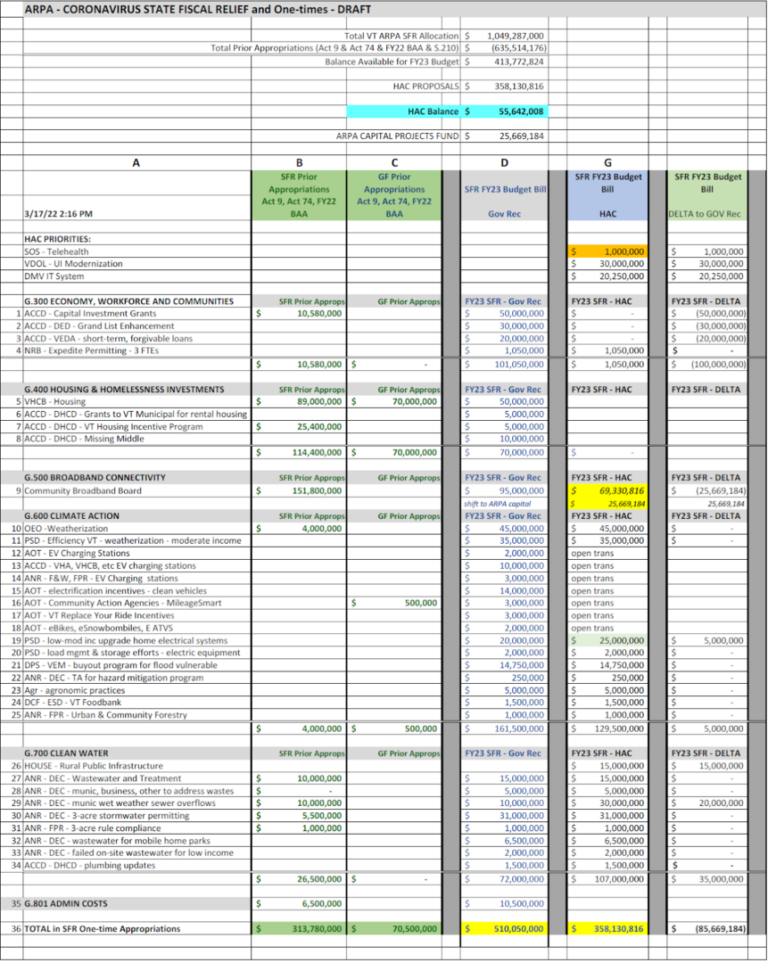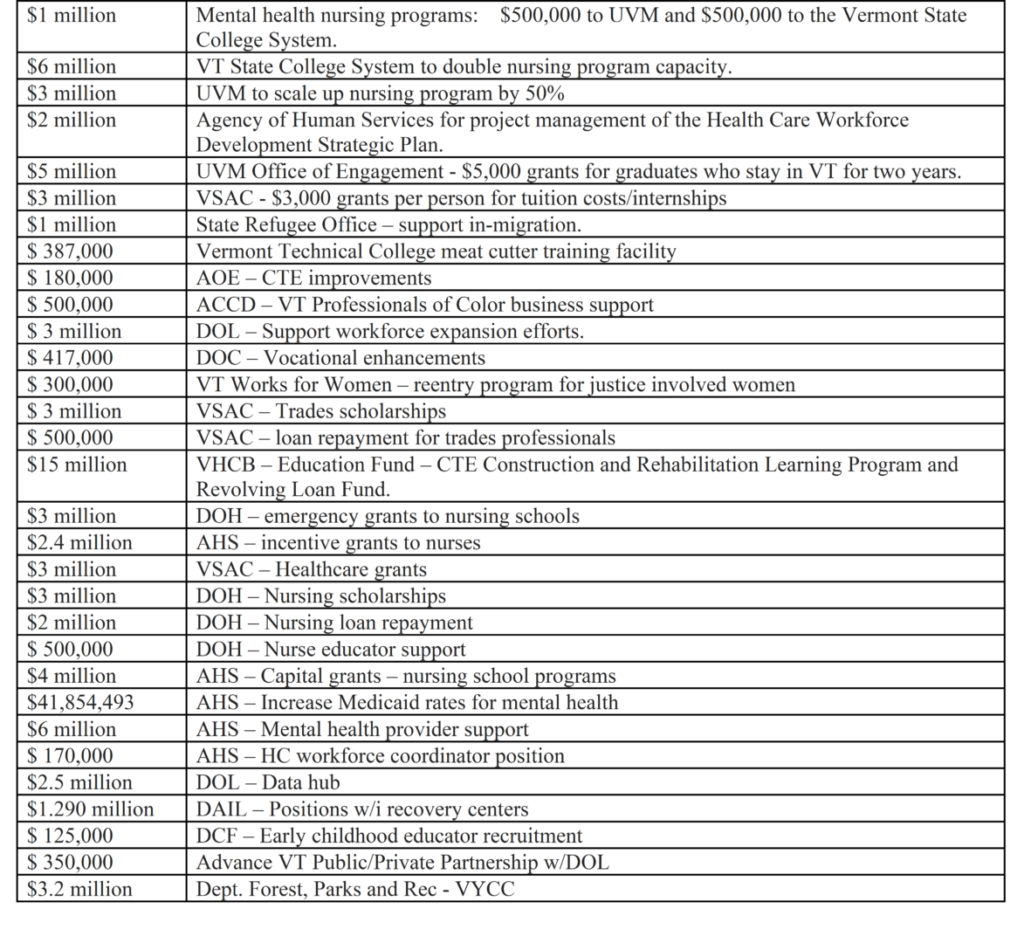Thank you to this week’s sponsor of our Advocacy Update:
March 18, 2022
The legislative session can be looked at in two buckets, “must-pass bills” and “everything else.” Those must-pass bills are those that keep the government moving and if the legislature did not pass them you would certainly notice. They include the budget adjustment act (signed into law this week) which corrects the previous year’s budget, the budget bill which sets next year’s spending, the transportation and capital bills that sets infrastructure spending, and the yield bill which sets property tax rates. This year, big components of the budget are also contained within the three omnibus bills we’ve continued to cover.
This week, all of those bills made big progress toward completion which serves as a warning to everyone that the clock is ticking. In the “everything else” category are individuals’ own “must-pass” bills, the things legislators see themselves personally having gone to Montpelier to accomplish. This is where the pace starts to pick up as the Appropriation Committees need to take out the carving knives and everyone pushes to get their priorities to the Governor’s desk.
Quick note: How are we doing? This is the tenth edition of this update for the 2022 session and we love the feedback we’ve gotten. We’re always looking to hear from you. How are you finding these updates? What would be helpful to you? Are they too long, too short, or just right? Send us comments at [email protected] and don’t hesitate to reach out on other issues, as always.
In this week’s update:
Thank You to Our Legislative Breakfast Attendees, Speakers, and Sponsor
This Monday we had our third, and final, legislative breakfast for this session, sponsored by New England Federal Credit Union. We appreciate the Legislators who joined us to network in January, the experts on benefits cliffs we spoke with in February, as well as the Governor and Senate President Pro Tem for their perspective this week.
At this week’s breakfast, Senate President Pro Tem Becca Balint conveyed concerns around the global economic ripple effects and how they are affecting Vermonters. The Pro Tem highlighted work the Senate is doing under her leadership to address the state’s housing crisis. Governor Scott used the opportunity to outline his continued efforts to hold the line on taxes and fees in the state and promoted his tax package to reduce taxes for 25% of Vermonters. He also conveyed his disappointment that the omnibus housing package contained the contractor registry which he had already vetoed.
Special thanks to the sponsor of our Legislative Breakfast Series:
State Budgeting Check In
This week, the Governor signed the Budget Adjustment Act (BAA) which had a slightly arduous journey this year. With this bill in the rearview mirror, full attention can be given to the budget bill (aka the “Big Bill) which starts in the House and is essentially the center of the legislative universe. As we’ve noted before, the budget will appropriate the remainder of the federal money sent to the state by the federal government to respond and recover from the pandemic. The below screenshot shows the trajectory of the budget for those funds.

On the education funding side, the House Ways and Means Committee passed the Yield Bill which sets statewide homestead and non-homestead property tax rates. Property tax rates will be lower this year, as can be seen in the table below which outlines the dollar tax per $100 of assessed property value.

The decrease was made possible by buying down the rate with some of the surpluses from the past fiscal year. The Scott Administration had proposed refund checks instead, arguing that the proposed rate buy-down is not as favorable because it will create more of a shock in FY 24 when the rates inevitably increase.
The Yield Bill sets aside $36 million in reserve from surplus to pay for universal school meals in anticipation of the federal government ceasing to pay for this in every district. The Committee heard concern from the Vermont League of Cities and Towns that such a provision might set the stage for this being a temporary funding source and suggested an alternative source or strong language that might go so far as to prevent a future legislature from using the property tax as a funding source.
From the Senate side, as the per-pupil weighing bill has advanced, the reshuffling of the deck will cause tax increases in some districts which will be offset this year by the tax rate buy-down.
Transportation Bill Passes House Committee
The House Committee on Transportation got to show other committees their big body of work, the Miscellaneous Transportation Bill. The massive annual bill proposes a great deal of funding for electric transportation this year. The bill has over $20 million in electric vehicle incentives in an effort to increase sales by roughly 520% in order to meet the goals of the Global Warming Solutions Act. It also includes $20 million to provide the charging infrastructure to support those vehicles.
The bill also contains $1.43 million in funding to continue fare-free service in Green Mountain Transit urban operations, with the exception of the LINK routes. The fare-free service started during the pandemic for reasons related to the safety of drivers and the public and is scheduled to end in May of this year. The bill also requires a study of the impacts of the zero-fare service on ridership and what would be needed to continue such service.
Read more about the T-Bill here:
As a side note on the subject of transportation, if you haven’t seen it yet, Amtrak is set to connect to Burlington in July.
Omnibus Economic Development Bill *Almost* Passes Committee
The Omnibus Economic Development Bill, H.159, previously S.263, almost passed out of Committee. Issues with the forgivable loan program to help businesses recover halted the bill, as a last-minute change shrunk the final award amount, likely making the program unusable for many businesses. If you hope to utilize the program, we urge you to reach out to members of the Committee.
If you’ve been following these updates, you may be confused about the change in bill number; the Committee added the bill they’ve been working on as a strike-all amendment to the bill the House Committee on Commerce and Economic Development sent over last session. This move allowed the bill to proceed after it did not make the crossover deadline and could have implications for how the bill proceeds in the future, as it would reach a Committee of Conference sooner than if they had sent a bill originating in the Senate.
The Committee will take up the bill Tuesday. The next hurdle for the bill will be the Appropriations process. As we noted in the budgeting section of this update, more State Fiscal Recovery funds are spoken for than are currently available and it remains unclear if the visions of this Committee are shared by appropriators as well as their counterparts in the House.
The Committee was given an allowance of $60 million by the Senate Appropriations Committee and had $26 million leftover from the last session’s economic appropriations. Here is what is in the latest version:

Omnibus Workforce Bill
The House Committee on Commerce and Economic Development’s omnibus workforce bill is nearing final completion after bouncing around the House to other committees that made language changes to the bill. The bill will appropriate over $105.7 million directed at alleviating workforce pain points that the Committee heard in weeks of testimony. Below is a quick view summary of the 62-page bill.

Laundry List
- Here are links to our past advocacy updates from this legislative session: Week 1, Week 2, Week 3, Week 4, Week 5, Week 6, Week 7, Week 8, and Week 9.
- Burlington Charter Changes, H.448 (carbon impact fee), and H.708 (just cause eviction) got their first look in the Senate Committee on Government Operations. Senators showed more skepticism than their colleagues in the House. The Committee will hear testimony next week.
- Legislative district reapportionment is moving right along. The House passed H.772 by a vote of 129-13 which advances the once every 10-year process of reapportioning House member districts following the new data from the U.S. Census. In the Senate, members of the Reapportionment Committee finished up their work with the intention to add the newly crafted Senate districts to H.772 when it is sent over from the House. The new districts need to be in the hands of the Secretary of State by April 1st, so there is no time to waste.
- The House this week passed the Clean Heat Standard by a vote of 96 to 44. An amendment to require the Legislature to review the work of the Public Utility Commission before the final creation of the program failed on a vote of 44 to 96. The Governor had made clear that he would like to see such language. Opponents of the amendment argued that it would effectively make the work of the PUC, which could take up to two and a half years, a study.
- The House Committee on Commerce and Economic Development took up for discussion H.570 which is focused on protecting consumers by enforcing the need for express consent given to data brokers and harvesters before using data and artificial intelligence to identify and track. The Committee is walking through the bill with the understanding that this work will likely come to a conclusion next year.
- The Senate Finance Committee did a quick run-through of the Omnibus Housing Bill and saw a fiscal note.
- H.178, a bill that enables non-unanimous jury verdicts in civil trials passed the Senate. Changes to the bill stipulate, “unless the parties stipulate otherwise, a verdict or finding agreed to by at least eighty percent of the total number of jurors serving on a jury in a civil trial shall be taken as the verdict or finding of the jury.”
- The House Committee on Judiciary took up for the first time this session the medical monitoring bill sent to them by the Senate, however, they are no stranger to the subject which has been in and out of their Committee for over six years. This time is different however with most parties in agreement with the language in S.113, though some concerns do linger around insurance carriers seeing the state as risky.
- The Senate Committee on Natural Resources and Energy began walking through the bottle bill, which was passed by the House last session. The bill expands the number of containers covered by deposits in the state which creates challenges for some smaller businesses.
- H.606 passed the House. It commits Vermont to the worldwide “30 by 30” movement, which aims to conserve at least 30% of the state’s land by 2030 and 50% by 2050.
- The House Committee on General, Housing, and Military Affairs continued work on H.329, a bill lowering the threshold for discrimination or harassment claims, with hope of finding a way to advance the bill despite missing crossover. The beginning of this video is a helpful walk-through outlining the bill and its implications as “one of the most protective states in the country” which might create the highest liability in the country. The Committee heard from an attorney representing the interests of many associations in education about schools being pulled in under the bill because they are a “place of public accommodation.”
- A must-read for everyone working in Vermont environmental policy was in the New York Times this week. Ezra Klien takes aim at how “one generation’s solutions have become the next generation’s problems … the environmental victories of yesteryear have become the obstacles of this year.” In the piece, he discusses the housing issues of California in the context of their landmark 1970 environmental law that has “become an all-purpose weapon for anyone who wants to stymie a new public project or one that requires public approval.” The piece even has a specific call-out of Vermont environmental groups squashing renewable energy and makes a great case that in this day-and-age moderates are the true environmentalists.
- The House passed H.518 which spends about $46 million for a Municipal Fuel Switching Grant Program.
- The House Ways and Means Committee passed the Miscellaneous Alcohol Bill which paves the way for Ready to Drink Cocktails (RTDs)to be sold outside of state liquor facilities. The bill faced some rough waters after JFO worried that RTDs would reduce revenues for the state, however, the Commissioner of DLC persuaded the Committee that they could close the gap. The new RTDs will be taxed at $0.55 per gallon, the same as beer.
Concerned or need to learn more about anything in this newsletter? Email our team at [email protected].
We look forward to working with you.
Sincerely,
The Lake Champlain Chamber Advocacy Team
Help us seek economic opportunity for all Vermonters. Support our advocacy work.
Become a member of the Lake Champlain Chamber or connect with our advocacy team to learn more about sponsorship opportunities

